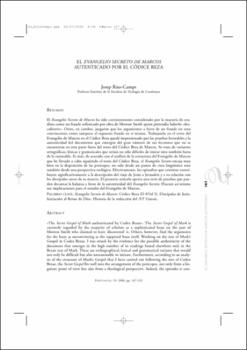El evangelio secreto de Marcos autenticado por el Códice Beza
Autor
Rius-Camps, JosepFecha
2008Resumen
El Evangelio Secreto de Marcos ha sido corrientemente considerado por la mayoría de eruditos como un fraude sofisticado por obra de Morton Smith quien pretendía haberlo «descubierto». Otros, en cambio, juzgaron que los argumentos a favor de un fraude no eran convincentes como tampoco el supuesto fraude en sí mismo. Trabajando en el texto del Evangelio de Marcos en el Códice Beza quedé impresionado por las pruebas favorables a la autenticidad del documento que emergen del gran número de sus lecciones que no se encuentran en otra parte fuera del texto del Códice Beza de Marcos. Se trata de variantes
ortográficas, léxicas y gramaticales que serían no sólo difíciles de imitar sino también fuera de lo razonable. Es más, de acuerdo con el análisis de la estructura del Evangelio de Marcos que he llevado a cabo siguiendo el texto del Códice Beza, el Evangelio Secreto encaja muy bien en la disposición de las perícopas, no solo desde un punto de vista lingüístico sino también desde una perspectiva teológica. Efectivamente, los episodios que contiene contribuyen
significativamente a la descripción del viaje de Jesús a Jerusalén y a su relación con los discípulos antes de su muerte. El presente artículo aporta una serie de pruebas que pueden decantar la balanza a favor de la autenticidad del Evangelio Secreto. Discute así mismo sus implicaciones para el estudio del Evangelio de Marcos The Secret Gospel of Mark is
currently regarded by the majority of scholars as a sophisticated hoax on the part of Morton Smith who claimed to have ‘discovered’ it. Others, however, find the arguments for the hoax as unconvincing as the supposed hoax itself. Working on the text of Mark’s Gospel in Codex Bezae, I was struck by the evidence for the possible authenticity of the
document that emerges in the high number of its readings found elsewhere only in the Bezan text of Mark. These are orthographical, lexical and grammatical variants that would not only be difficult but also unreasonable to imitate. Furthermore, according to an analysis of the structure of Mark’s Gospel that I have carried out following the text of Codex
Bezae, the Secret Gospel fits well into the arrangement of the pericopes, not only from a linguistic point of view but also from a theological perspective. Indeed, the episodes it contains contribute significantly to the depiction of Jesus’ journey to Jerusalem and his relationship with his disciples before his death. The proposed paper sets out the detailed evidence, which tip the balance in favour of the authenticity of the Secret Gospel. It also discusses its implications for the study of the Gospel of Mark.





